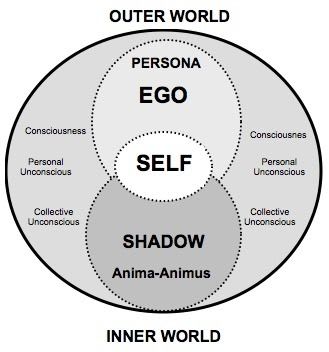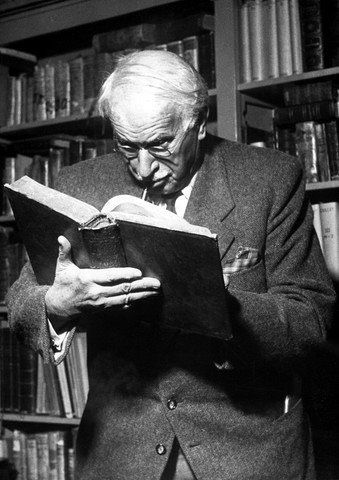作品 1872 年、荒野のキリスト、イヴァン・クラムスコイ作
Artwork 1872 Christ In The Wildemess, by Ivan Kramskoi
「完全な」人だけが、人間が自分にとってどれほど耐え難いものであるかを知っています。
カール・G・ユング(CW 9ii、Para :125)
Only the "complete" person knows how unbearable man is to himself.
Carl G Jung (CW 9ii, Para :125)
自己の元型が優勢になるときは常に、避けられない心理的帰結は、キリスト教の十字架の象徴である磔よって鮮やかに例証される葛藤の状態です。つまり、「終焉」という言葉によってのみ終結する、救いのない急性の状態です。 したがって、元型の認識は、決してキリスト教の神秘を回避するものではありません。 むしろ、それなしでは「救い」が無意味に見えるような心理的前提条件を強制的に作り出します。 「救い」とは、本来負うべきではなかった重荷を肩から降ろすという意味ではありません。 「完全な」人だけが、人間が自分にとってどれほど耐え難いものであるかを知っています。 私が見る限り、キリスト教の観点からは、私たちに自然から課せられた個性化の課題と、私たちの全体性または完全性の認識を拘束力のある個人的な義務として受け入れる人に対して、適切な異議は唱えられません。 もし彼が意識的かつ意図的にこれを行うなら、彼は抑圧された個性化による不幸な結果をすべて回避することができます。 言い換えれば、もし彼が自発的に完全性の重荷を自分自身に引き受けるなら、それが自分の意志に反して否定的な形で「起こっている」と感じる必要はないのです。 これは、深い穴に落ちる運命にある人は、後ろ向きに穴に落ちる危険を冒すよりも、必要なすべての予防策を講じてそれに取り組む方が良いと言っているのと同じです。 カール・G・ユング (CW 9ii、パラ 125)
Whenever the archetype of the self predominates, the inevitable psychological consequence is a state of conflict vividly exemplified by the Christian symbol of crucifixion—that acute state of unredeemedness which comes to an end only with the words “consummatum est.” Recognition of the archetype, therefore, does not in any way circumvent the Christian mystery; rather, it forcibly creates the psychological preconditions without which “redemption” would appear meaningless. “Redemption” does not mean that a burden is taken from one’s shoulders which one was never meant to bear. Only the “complete” person knows how unbearable man is to himself. So far as I can see, no relevant objection could be raised from the Christian point of view against anyone accepting the task of individuation imposed on us by nature, and the recognition of our wholeness or completeness, as a binding personal commitment. If he does this consciously and intentionally, he avoids all the unhappy consequences of repressed individuation. In other words, if he voluntarily takes the burden of completeness on himself, he need not find it “happening” to him against his will in a negative form. This is as much as to say that anyone who is destined to descend into a deep pit had better set about it with all the necessary precautions rather than risk falling into the hole backwards. Carl G Jung (CW 9ii, Para 125)
「終焉」
(ヨハネによる福音書19章30節)
イエスはこのぶどう酒を受けると、「成し遂げられた」と言い、頭を垂れて息を引き取られた。
そして三日後に蘇られた。
「神の変化の過程は、人間の理解には、罰、苦悩、死、変容として現れる。
~カール・ユング、CW13:錬金術的研究、パラ139
“The divine process of change manifests itself to our human understanding . . . as punishment, torment, death, and transfiguration.”
~Carl Jung, CW 13: Alchemical Studies, Para 139
後の世代は文字どうりではなく象徴的に死と再生を生涯に渡って繰り返すこと(個性化)と言う意味です。
キリスト教の殉教は自我の完全な放棄を意味し、当時それは絶対に必要であった。
永遠に自我として生きるのは不可能だし、あまりにも幼稚だ。
もちろん、多くの人は自我を自己とみなすという大きな間違いを犯します。
自我とは人工的な自己にほかなりません。 ~カール・ユング、ビジョンセミナー、369ページ
Christian martyrdom meant the complete abnegation of the ego, which was absolutely necessary at that time.
It is impossible to live as an ego forever, it is too childish.
Of course, many people often make the great mistake of taking the ego for the Self.
The ego is nothing but the artificial self. ~Carl Jung, Visions Seminar, Page 369
「決して狂わない人もいる。彼らは本当に恐ろしい人生を送らなければならないのでしょう。」
― チャールズ・ブコウスキー
“Some people never go crazy. What truly horrible lives they must lead.”
― Charles Bukowski
>もし彼が意識的かつ意図的にこれを行うなら、彼は抑圧された個性化による不幸な結果をすべて回避することができます。
それは......完全に放棄された孤独の状態においてのみ、われわれは自分自身の本性の役に立つ力を経験することができる。~カール・ユング;魂を求める現代人
個性化のプロセスは自然法則の経験であり、意識によって認識される場合もあれば、認識されない場合もあります。 ~カール・ユング『手紙』Vol. II、292~294ページ。
The individuation process is the experience of a natural law and may or may not be perceived by consciousness. ~Carl Jung, Letters Vol. II, Pages 292-294.
個性化は超越的機能と密接に関係しています。 ~CG Jung、CW 6、パラ 757-762
Individuation is closely connected with the transcendent function. ~CG Jung, CW 6, para 757-762



